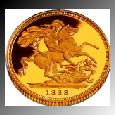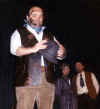Rainbow Theatre
Pygmalion


by George Bernard Shaw
Directed by Makki Marseilles
Costumes / Hats by Kim
O'Neill
Premiere : 23 November 1996
"You see this creature with her kerbstone English:
the English that will keep her in the gutter to the end of her days. Well,
sir, in three months I could pass that girl off as a duchess at an
ambassador's garden party."
Professor
Higgins claims when he first sees Eliza selling flowers in the street
outside Covent Garden. But Bernard Shaw's dramatization of a Cockney
flower girl's metamorphosis into a lady not only is a delightful fantasy
but also has much to say about social class, money, spiritual freedom and
women's independence.

 The Author
George Bernard
Shaw
was altogether an extraordinary man and a
prolific writer. Born in Ireland in 1856, he left school at
the age of fifteen to work as a boy in a Land Agent's firm. He
has written four novels, over fifty plays of varying lengths,
hundreds of political, literary and economic pamphlets,
critical essays which became books in their own right and what
must have amounted to thousands of letters. He also spoke to
every organisation and society possible as he claimed to have
an opinion on everything. He was a teetotaler and a
vegetarian; he championed human and animal rights; he had
views on language both spoken and
written;
The Author
George Bernard
Shaw
was altogether an extraordinary man and a
prolific writer. Born in Ireland in 1856, he left school at
the age of fifteen to work as a boy in a Land Agent's firm. He
has written four novels, over fifty plays of varying lengths,
hundreds of political, literary and economic pamphlets,
critical essays which became books in their own right and what
must have amounted to thousands of letters. He also spoke to
every organisation and society possible as he claimed to have
an opinion on everything. He was a teetotaler and a
vegetarian; he championed human and animal rights; he had
views on language both spoken and
written;
on politics, religion (he hated Christmas), domestic matters, the theatre, and personal habits. He died in 1950 at the ripe age of 94.
His career as a playwright started
after he moved to London in 1876 to join his mother who had left his
father to follow her singing teacher there. After a period of unemployment there, he
started reviewing art, music and drama in various journals of the
period. He started writing plays in 1884 because he thought what was
put on in London on the Victorian stage was trivial and without
meaning. He pursued the theatre of ideas and held up as an example
the great Norwegian dramatist Henrik Ibsen, whose plays such as "Hedda Gabler" and "Ghosts" were causing sensation among audiences.
He wanted to be considered a realist and he once wrote to the critic
William Archer "To me the play is only the
means, the end being the expression of feeling by the arts, of the
actor, the poet, the musician. Anything that makes this expression
more vivid is so much to the good for me."
|
| ||||||
Copyright © 2003 Top























